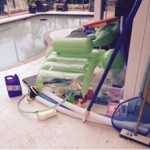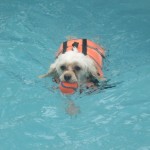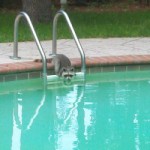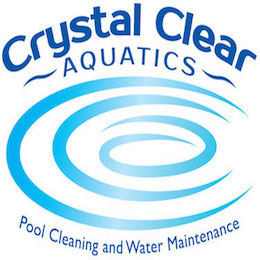Are all filter cartridges of same quality?
Not all filter cartridges are of the same quality, that is why we only use original equipment manufacturers’ (OEM) and Unicel brand high-quality filters.
When was the last time you replaced your filter? The filtration experts at Unicel recommend replacing your filter when it exceeds 10 PSI from the initial “new filter” starting point. This typically results in replacing your filter every 12 months. The climate here in Florida is exceptionally different. Sand, dirt, dust, suntan lotion and especially pollen contribute to clogging the small cells. Once your filter is clogged it significantly reduces water flow and can aid in the blooming of algae. That is why we clean your filter monthly and recommend replacement of your filter yearly.
One of the first things a filter expert will look for when examining a pool or spa element is the pleat fold or “knuckle radius” of the pleat. Why is this important? If you look carefully, you will notice that some manufacturers’ pleats are very sharp while others are rounded and even appear puffy. With Reemay or other spunbonded polyester medias it is much easier to make a rounded fold than a sharp pleat. Moreover, a rounded fold can mask the filter manufacturer’s inability to make straight pleats or maintain proper pleat spacing.
The cloth used on Unicel’s D.E. grids is 100% Polypropylene unlike other filter manufactures. This fiber, a member of the Polyolefin family, has excellent resistance to acids, alkalis, and abrasion, in addition to being both rot and mildew resistant. The use of polypropylene cloth for swimming pool filtration was originally developed by Meissner Mfg. Co. (Unicel’s parent company) during the 1950s. Throughout the forty-year span that polypropylene cloth has been used in this application, this fabric has gone through several modifications. Improvements to critical properties such as yarn construction, weave pattern, and fabric finishing have allowed us to better control the fabric’s “permeability” in order to optimize the D.E. cake handling characteristics. Permeability is the cloth’s flow resistance, expressed in “cubic feet per minute” of airflow as measured with a Frazier permeability machine.
Unicel filters have sharp folds increase the spacing between pleats making it easier to flush out loose debris. Eliminates bridging allows particles to get down into the pleat instead of laying across the top of two or more pleats. This assures maximum dirt holding. Full utilization of the pleat surface allows debris to build up from the inside out, critical to obtaining the maximum cycle life between cleanings. Maximizes flow, minimizes pressure loss – by decreasing the surface contact between the inner pleat knuckle and center tube.
Is there a charge for a service call?
The answer is YES – and NO!
There is a charge for our technician to go out to examine your equipment to determine your repair needs. All diagnostic or repair calls are subject to a fee if customer elects not to have repairs performed by Crystal Clear Aquatics. However, this charge will be waived IF your repair work is performed by Crystal Clear Aquatics.
Can I get a pool cleaning estimate over the phone?
In general, NO. To provide an accurate estimate, a site visit is required.
Your monthly service rate is determined by several factors including: dimensions of your pool, number of gallons of water, estimated chemical demand, age and condition of components, condition and type of pool surface, and type of service being provided. Other factors considered are: access of pool, robotic cleaners, screen enclosure vs. open-air, and nearby trees, shrubs and vegetation.
What is the customer’s/homeowner’s responsibility?
- The homeowner/customer is responsible for keeping the pool/spa support equipment and interior finish in good repair and to provide any additional equipment needed for the pool to function properly. Many pool owners are hesitant to spend money to properly maintain their pool/spa equipment. The disadvantages to lack of proper maintenance include blocked filters (which can cause algae to form in the pool), damaged filter systems and pumps which can cost more money in the long run than what would have been spent on proper, routine maintenance.
- Homeowner/customer is responsible for securing children/pets to prevent injury or loss while technician is servicing pool.
- Gates, walkways, pool area and equipment must be kept clear to provide easy access.

Is there a limit to service provider’s responsibility?
Yes. Crystal Clear Aquatics is not responsible for: maintaining the regular water level, cleanliness of pool should customer choose to not replace filter cartridge as recommended, conditions caused by aging and/or neglect of pool and equipment, unattended children or pets during times of service, lost/loss of animals, excessive debris due to landscapers, roof cleaning/replacement, deck cleaning, acts of vandalism, or acts of nature.
Are you licensed and insured?
Crystal Clear Aquatics, LLC (d/b/a Crystal Clear Aquatics Pool & Spa Services) is a Limited Liability Company with certified “Active Status” with the State of Florida. We possess business licenses with both Palm Beach County and the Village of Wellington. We maintain both general liability insurance and vehicle insurance. We are also registered as a licensed and insured service provider within the Town of Jupiter Inlet Colony.
Is it safe to have my dog in my pool?
Dogs are great companions, but if allowed in your pool, they can sometimes contaminate the water and spread germs that cause disease. It is important to always keep your pool clean and take precautions when any animals have been in or near the pool. And dog hair can accumulate in the skimmer basket and filter cartridge affecting flow of water and preventing proper filtration.
Some people also think that swimming is a skill that all dogs naturally have. Why would they call it the “doggie paddle” unless it was something all canines could do? But swimming isn’t necessarily an innate ability for dogs. And, yes, dogs do drown. Be sure your dog does not swim to the point of exhaustion and be sure he/she knows the way out of the pool.
 Swimming does seem to be a favorite sport for many dogs, even in the family pool! It is a great way to exercise your dog and is a non-weight bearing activity that reduces strain on the joints. However, dogs who swim in pools may have dry, itchy skin and irritated eyes due to the effect of chlorine and other chemicals in the water. Swimming dogs are also at increased risk of ear infections because water in the ear canals produces a perfect environment for bacterial growth.
Swimming does seem to be a favorite sport for many dogs, even in the family pool! It is a great way to exercise your dog and is a non-weight bearing activity that reduces strain on the joints. However, dogs who swim in pools may have dry, itchy skin and irritated eyes due to the effect of chlorine and other chemicals in the water. Swimming dogs are also at increased risk of ear infections because water in the ear canals produces a perfect environment for bacterial growth.
After a swim, rinse your dog thoroughly with fresh water and dry him/her. Clean and dry his/her ears throughly and use a gentle ear cleaner weekly. Products are available at your local pet supply to rinse eyes, dry out “swimmer’s ear” and prevent infection. Have fresh water and shade available for your tired dog to rest after swimming.
Raccoons have been in my pool. Should I be concerned?
YES. Raccoons are pests and can spread germs to humans. It is important to keep raccoons out of your pool and watch for raccoon feces (poop) in and around your pool.
 Raccoons visit pools to wash, then eat their food or just to go for a swim. While raccoons are eating or swimming in the pool, they are swallowing salt water which causes them to defecate (poop) in the pool.
Raccoons visit pools to wash, then eat their food or just to go for a swim. While raccoons are eating or swimming in the pool, they are swallowing salt water which causes them to defecate (poop) in the pool.
Raccoon feces can sometimes contain the eggs of a roundworm parasite called Baylisascaris procyonis, which can infect humans, particularly children, and cause severe neurologic illness. People can be exposed to the Baylisascaris eggs by swallowing them in pool water contaminated by raccoon visits.
In addition to possible illness, raccoon feces can cause damage to your filtration system which may be costly to repair.
For further information on raccoons in your pool, Baylisascaris, or other articles relating to healthy pool water, visit www.cdc.gov/healthywater/swimming/.

